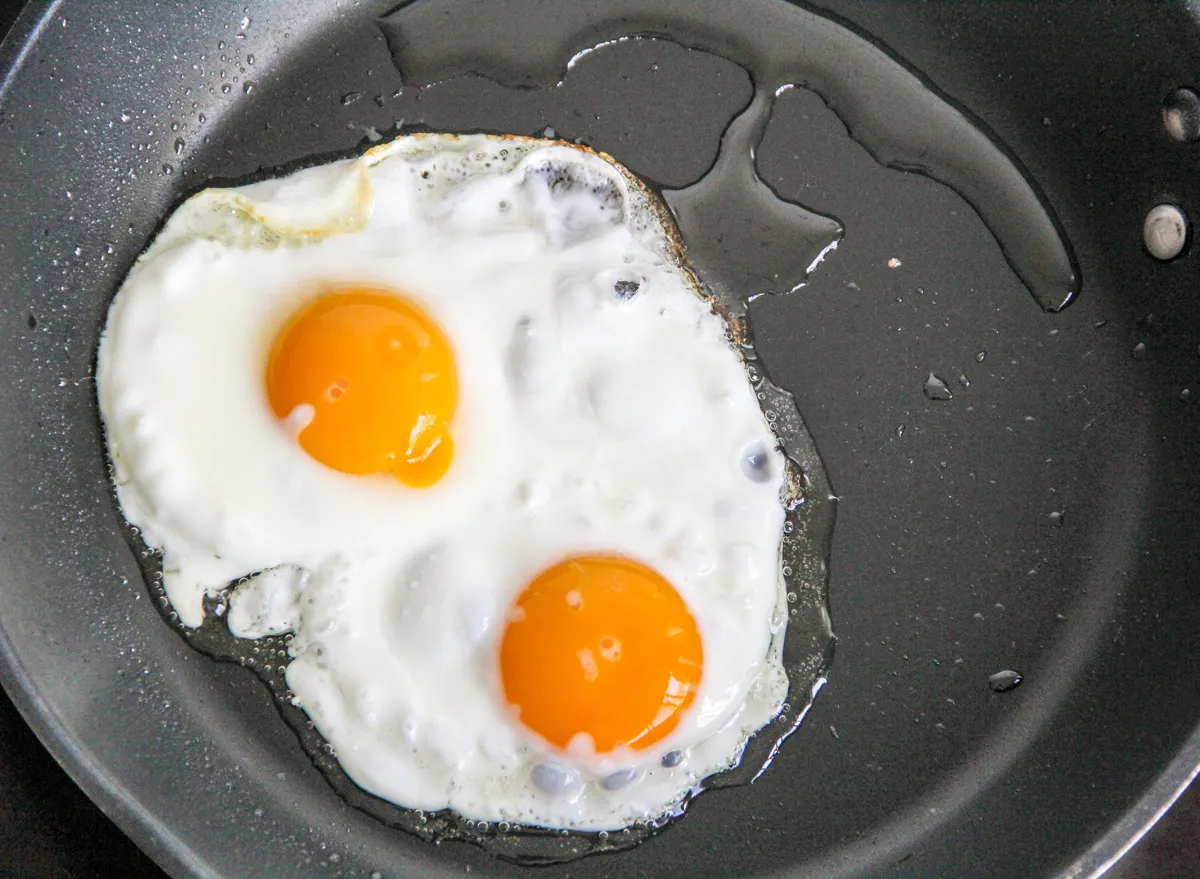Are Eggs Good for You? 10 Science-Backed Effects of Eating Them Every Day

Eggs are a great food to incorporate at any time of day. They can be delicious scrambled up with some toast and bacon, hard-boiled and sliced as a Cobb salad topping, or thrown into a fried rice dish for dinner. You can also take a hard-boiled egg on the go when you're in need of a quick snack. Regardless of how you enjoy eating them, it's hard to deny the fact that the nutritional value of this food has been the subject of debate for quite some time. For instance, eggs have been known as a cholesterol-raising snack for decades, which has had many people wondering if eggs are even good for you at all.
Although it's been a subject of debate in the past, recent researchers and medical experts have concluded that eggs not only don't raise cholesterol, but they are in fact good for you! Eating an egg will give you a boost of helpful vitamins, nutrients, and minerals that can contribute to a variety of positive health outcomes.
For more information on how eggs are good for you, read on to learn TK effects of eating them. Then, for more healthy eating tips, check out Is Canned Tuna Healthy? 5 Side Effects of Eating It.
Egg nutrition information

Nutrients per 1 large egg (50.3 grams):
- Calories: 71.9
- Fat: 5.01 grams
- Saturated Fat: 1.61 grams
- Sodium: 64.9 milligrams
- Carbs: 0.5 grams
- Sugar: 0.1 grams
- Fiber: <0.75 grams
- Protein: 6.24 grams
10 health benefits of eating eggs

Eggs are a complete protein
There are about 6 grams of protein in one egg, and this protein is considered "complete," meaning it carries all nine of the essential amino acids that your body can't produce on its own. Other complete proteins include beef, chicken, fish, pork, tempeh, and soy tofu, and foods like whole grains, vegetables, nuts, and seeds are considered "incomplete." It's not to say that incomplete isn't important, but balancing your diet out with both kinds is best.
Eggs are also a lean protein, meaning they don't carry a lot of saturated fat. With just 1.6 grams of saturated fat per egg, getting your protein from an egg can help keep your saturated fat at bay when compared to other protein sources like steak, beef, lamb, pork, etc.
Eggs may help improve cholesterol levels
Eggs are a source of dietary cholesterol, which is one of the reasons many people assume that eating eggs will raise your body's cholesterol levels. However, eggs have actually been found to do the exact opposite.
For one, just because a food is high in cholesterol doesn't mean it will raise your cholesterol levels. Not only that, but it's actually foods that are high in trans fats, saturated fat, and added sugars that are linked to higher levels of cholesterol.
One study published in the American Journal of Clinical Nutrition found that eating a lot of dietary cholesterol and having one egg per day were not associated with high cholesterol or coronary heart disease. Another study found that eggs were actually able to improve HDL cholesterol, which is considered to the the "good" kind of cholesterol. Having enough HDL cholesterol is crucial for absorbing LDL cholesterol and removing it from the bloodstream.
You may lose weight
If you swap your carb-heavy breakfast for some eggs, you can support your body's ability to burn fat and lose weight. In one 8-week study published in the International Journal of Obesity, people ate a breakfast of either two eggs or a bagel, which contained the same amount of calories. The egg group lost 65% more body weight, 16% more body fat, experienced a 61% greater reduction in BMI, and saw a 34% greater reduction in waist circumference compared to those who consumed the bagel breakfast.
You may gain muscle
While not incredibly high in protein at 6 grams per large egg, eggs can be a healthy part of a high-protein diet that can support muscle gain.
If you want to build muscle from exercising, your body needs protein to repair the tears in your muscle tissue, which increases your metabolism, according to a study published by the International Journal of Sport Nutrition and Exercise Metabolism. The amino acids in the egg can help provide your body with the protein it needs to build that muscle you desire!
Whisk two eggs into a veggie omelet or pack two hard-boiled eggs in your snack box, and you have the perfect meal or snack for getting lean and toned.
Eggs are a good source of vitamin D
You can increase your vitamin D intake by stepping out into the sun or by including vitamin D-rich foods, such as eggs, to your diet. Eggs contain 6% of your daily intake of vitamin D, a vitamin that is found in very few food products. Vitamin D plays roles in both immune health and calcium absorption, which can support bone health.
Choline in eggs may help your brain
Eggs are one of the richest dietary sources of choline, a nutrient found in many types of food. For example, there are about 147 milligrams of choline in one egg, which is about 27% of your recommended daily value. This is more choline than what is found in beef, chicken, fish, potatoes, beans, milk, and yogurt.
According to the National Institute of Health, research has tied choline to two major areas of health: neurological and liver health. One Norwegian study found that participants with lower levels of choline had poorer cognitive function than those with higher choline levels, and some experts have theorized that there could be a connection between choline intake and reduced risk of Alzheimer's and dementia because of a chemical called phosphatidylcholine. This chemical is found in eggs and a source of choline in the body, and has been known to help improve cognitive function in adults.
Choline found in eggs supports liver health
Speaking of choline, this nutrient has been found to help your liver health as well. According to a study published in the Journal of Nutrition, consumption of dietary choline was linked to a lower risk of non-alcoholic fatty liver disease—a group of liver issues not connected to your alcohol consumption—in Chinese adults who were considered to be at a "normal" body weight. In a recent 2022 study published in Nutrients, researchers found that a combination of choline and betaine (which is found in things like whole grains, beets, and all-purpose flour), helped reduce the risk of visceral obesity-related hepatic steatosis (also known as fatty liver disease).
Eggs are a good source of dietary phospholipids
Eggs are one of the top sources of phospholipids—structural fatty acid compounds that are a key component of biological membranes—in our diets. Based on the estimated average egg intake in the U.S., eggs make up 10%–40% of our total daily phospholipid intake. According to a report published in Nutrients, egg phospholipids have been shown to inhibit cholesterol absorption, increase levels of the "good" HDL cholesterol, and help lower certain inflammatory biomarkers.
Eggs may help reduce inflammation
One Nutrition & Metabolism study found that when overweight men consumed three eggs per day for 12 weeks, their levels of an inflammatory biomarker known as plasma C-reactive protein (CRP) decreased significantly more than when consuming a yolk-free egg substitute with lower phospholipid levels.
Chronic inflammation is a major health problem because according to the National Center for Biotechnology Information, it is a common cause of many chronic diseases such as diabetes, cardiovascular disease, arthritis, and cancer. While many different factors can play a role in reducing inflammation, like lowering stress, incorporating more exercise, and giving up tobacco, your daily diet is a significant factor in the reduction of inflammatory markers in your body.
They're a good source of selenium
Selenium is a mineral that your body needs, but only in small amounts, and eggs are an easy way to help you get the amount you need. In just one egg, you'll get about 15 micrograms of selenium, which is about 27% of your recommended daily value. Getting enough selenium, even though it's a small amount, is crucial because of its antioxidant properties. According to Harvard Health, selenium can help protect against cancer, thyroid disease, and cardiovascular disease, and a deficiency in this mineral has been associated with osteoarthritis and Keshan disease (a type of heart muscle disease).
- Source: https://fdc.nal.usda.gov/fdc-app.html#/food-details/748967/nutrients
- Source: https://my.clevelandclinic.org/health/articles/16867-cholesterol--nutrition-tlc
- Source: https://www.sciencedirect.com/science/article/pii/S0002916522065765?via%3Dihub
- Source: https://pubmed.ncbi.nlm.nih.gov/23021013/
- Source: https://ods.od.nih.gov/factsheets/Choline-HealthProfessional/
- Source: https://ods.od.nih.gov/factsheets/Choline-HealthProfessional/#h7
- Source: https://pubmed.ncbi.nlm.nih.gov/22717142/
- Source: https://www.sciencedirect.com/science/article/abs/pii/S0197458013003357
- Source: https://www.ncbi.nlm.nih.gov/pmc/articles/PMC8779168/
- Source: https://www.ncbi.nlm.nih.gov/pmc/articles/PMC4425170/
- Source: https://nutritionandmetabolism.biomedcentral.com/articles/10.1186/1743-7075-5-6
- Source: https://www.ncbi.nlm.nih.gov/books/NBK493173/#:~:text=Chronic%20Inflammation-,Chronic%20inflammation%20is%20also%20referred%20to%20as%20slow%2C%20long%2Dterm,repair%20and%20overcome%20the%20damage.
- Source: https://www.hsph.harvard.edu/nutritionsource/selenium/
- Source: https://www.hsph.harvard.edu/nutritionsource/selenium/









